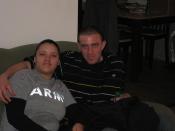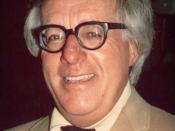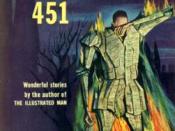How would you feel if the world as you know it was suddenly gone, everything that you knew was completely changed and you had no way of stopping it. Would you feel scared, angry, depressed, happy, or something entirely different? In Ray Bradbury's Fahrenheit 451, the story of a society completely backward from our own is depicted through the eyes of a man who is becoming awakened to his life. Also how the people around him are reacting to this, such as his wife, Mildred who is depressed about it, his new friend Granger who is optimistic about it, and his other friend Faber who has mixed feelings about it. The real thing to wonder is what is the best reaction towards the situation.
In the book, the protagonist, Guy Montag's wife is a prime example of how the average person in the society responds to the extremely controlled environment.
The person becomes withdrawn from those around him or her, save those he/she briefly corresponds with in a high-tech T.V.-like interface. The person then more or less begins to act like everyone else, not that it's really such a bad thing because no one notices that everyone is the same. However there are people such as Mildred who on a subconscious level realize that something is wrong and are either greatly disturbed by it or in her case, are saddened by it. Mildred herself is in fact so saddened by the fact the she basically has no control over her life and that she has no way of expressing her emotions, that she tries to end her own life. And when she is discovered by her husband and is saved, she not only pretends to not remember it have happening, she just thinks it's a joke all together. "Yes,"ÃÂ he said. "I wanted to talk to you."ÃÂ He paused. "You took all the pills in your bottle last night."ÃÂ "Oh, I wouldn't do that,"ÃÂ she said, surprised. "The bottle was empty."ÃÂ "I wouldn't do a thing like that. Why would I do a thing like that?"ÃÂ she said. "Maybe you took two pills and forgot and took two more, and forgot again and took two more, and were so dopey you kept right on until you had thirty of forty of them in you."ÃÂ "Heck,"ÃÂ she said, "what would I want to go and do a silly thing like that for?"ÃÂ p.19.
Then on the complete opposite of the playing field is that of hope for the situation. This aptly displayed by Montag's friend Granger. Now even though the two don't meet until the end of the book, in the short time that they are together Montag learns very much about the importance of books, and how to have hope in mankind saving itself. Granger does this mainly by telling Guy a story of his grandfather and how he spent his time on Earth. Granger turned to Montag. "Grandfather's been dead for all these years, but if you lifted my skull, by God, in the convolutions of my brain you'd find the big ridges of is thumbprint. He touched me"æ"ÃÂStuff your eyes with wonder,' he said, "ÃÂlive as if you'd drop dead in ten seconds. See the world. It's more fantastic than any dream made or paid for in factories.' P. 157. The point that Granger eventually makes is that people who are enlightened as to what is going wrong cannot force other people to see the errors in their ways, but must subtly help them along and let them see their own mistakes. Granger offers Guy a sense that they are not in as nearly as much trouble as he thinks they are.
Now of course with every battle there is a middle ground, a place where both sides meet and can have say. This naturally is shown by Guy's other new friend, Faber, who displays this by being both a scared coward and a courageous optimist. The first impression that is given by Faber is that he is a lunatic, he is approached by Guy out of nowhere and immediately gets defensive about something his under his coat and is screaming about how he didn't do anything. Then later when Guy follows through to go visit Faber he discovers that the man is really just a poor old coward who could have, but did nothing to stop the destruction of books and ultimately, social society. "Montag, you are looking at a coward. I saw the way things were going, a long time back. I said nothing, I'm one of the innocents who could have spoken up and out whenno one would listen to the "ÃÂguilty,' but I did not speak and thus became guilty myself."ÃÂ P. 82. And it is even more confusing when he refuses to help Montag. Then even after he does agree to help, it is still unclear whether he is helping because of the bible Guy has or because he is a descent person. We start to get the impression that he is willing to help for the benefit of those other then himself when he puts his own neck on the line by showing and giving Guy the radio transmitter that he invented. And then when it comes down to the wire, and Guy is running for his life and goes to Faber's home we discover that Faber does, after all believe that there is hope for everyone. And that they can get out of this self-destructive society and makes the ultimate sacrifice for Guy by risking his own life to help him get away.
So what exactly is the best reaction for someone to have towards this type of thing, god forbid it ever happen? So far we've seen a few different classic emotions that someone might portray given the circumstances, such as complete sadness and apathy as well as hopefulness. And although Mildred, Faber and Granger weren't the only people in the book to have acted like this they were the clearest. The whole point of it is that when faced with a situation like this the best thing to is not to get down in the dumps and all depressed, but to try and see the brighter side of things.





